|
|
Post by hoosier on Sept 19, 2005 17:52:22 GMT -5
Backtracking a bit--talking about the character and RE's take on him--a character is like a framework that the writer hangs emotions,characteristics etc.,he gives him a past and hopefully a future. The actor's job is to intrepret the writer's creation and infuse it with life. A good actor makes you feel like you know the character and care about him/her. Its like the actor and the character become one. Some of Ron's traits have become Dunbar's--the lip bite, the facial shrug. the "thinking" mode. To make a character truly work,the actor has to get inside their head and see what makes them tick--that method acting we are always hearing about. Some actors have become so identified with a character that you can not imagine anyone else playing them--Clark Gable as Rhett Butler,Humphrey Bogart as Rick, Marlon Brando's Godfather. Look at Alan Alda as Hawkeye--Donald Sutherlin played him in the movie but I bet you if you asked people a majority would say Alda.
Of course,RE has his own interpretation of Dunbar. If he palyed him as noble, he wouldn't have been as interesting. Dunbar's struggle not to be a schumk, to not be an object of pity, to live his life on his terms is what captured our interest and keeps us rehashing each episode and each character. Concerning Dunbar's continued infidelity--its hard to resist temptation. I am sure plenty of women came his way. If he regained his sight,temptation might prove to be too much. Maybe,he has and will continue to grow and his marriage to Christie will become the focus of his life. Who knows?
|
|
|
|
Post by maggiethecat on Sept 19, 2005 18:23:29 GMT -5
[quote On the other hand, we didn't see Jim tempted to stray in the series, so we don't know for sure how he would have dealt with temptation. I have to throw in my question here. At the end of the Pilot, Jim asked Karen her eye color and she told him not to make his moves on her. He told her that's not what he's doing, he just wanted to know what color her eyes were. If we believe him and, I do, listening to how he says it, then could he have changed and is no longer the womanizer he was before he lost his sight? After all, it's been about a year since the shooting, well past the time period RE spoke about in the interview (...if he'd gotten his sight back in a few weeks he'd be cheating..., or words to that effect). That is what I thought, that at the very least, the womanizing side of his personality had changed. I think that can be construed as a change in his base personality. Jim says as much to Karen, when they're in her car for the first time and she hits him with Anne Donnelly. 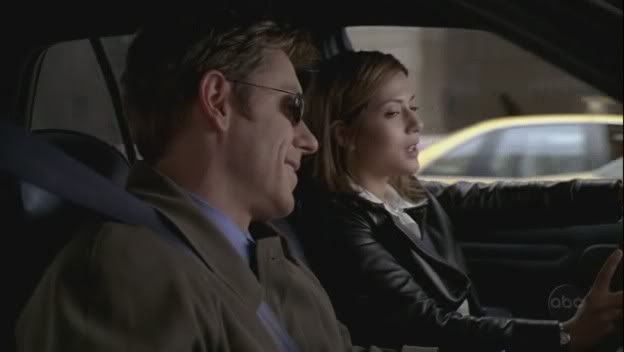 "I was going through a bad time in my marriage," he says (or words to that effect.) "I've done a lot of growing up since then." Despite Ron Eldard's amusing remarks about Dunbar cheating again "in about three days" if he got he sight back, well, that a wonderful example of a skilled and humorous actor "riffing" on the character. If we go by the lines in The Pilot, however, we can infer that Dunbar, at least for now, thinks his cheating days are over. |
|
|
|
Post by kytdunne on Sept 20, 2005 2:36:51 GMT -5
That is what I thought, that at the very least, the womanizing side of his personality had changed. I think that can be construed as a change in his base personality. Good example of how you're viewing the character, thanks. And now that brings up a new curiosity question (not that this should surprise anyone): How would you (anyone) define a womanizer? And having defined it, is/was Dunbar a womanizer? Here's one definition (and the one I think of when I hear the word): womanizer: A man who likes many women and has short sexual relationships with them.Kyt |
|
|
|
Post by hoosier on Sept 20, 2005 17:47:09 GMT -5
When I looked at my post from yesterday the ending seemed rather flippant and that's hardly what I meant to be. I am sure a lot of temptation came Jim's way--he is an extremely good-looking guy. You either say no or yes and he obviously said yes at least once to Anne Donnelly. Would he say yes again? RE seemed to think so--IF he got his sight back in a short time. I think that line is telling. If Dunbar had regained his sight in a few days or weeks or maybe even a few months, he might have reverted back to his old ways. But he is permanently and totally blind forever. Has been for over a year. He has had to take a long hard look at his life. He has told himself that he isn't the same man he was before he lost his sight. That he isn't going to cheat. Does Christie believe him. Maybe, she hopes that it is true but its still too early to tell. I feel that they haven't even really discussed his affair--the only confrontation we saw was after Clay's party when he accused her of possibly running off to Spain. If Jim was able to regain his sight he maight have followed the same pattern but since he won't not only is the visual temptation gone but it was Christie who stood by him and supported him. If Christie had left, would Anne have stepped up???
Oh and Shmeep--I do see your point! On the one hand ,Jim was so mad about the situation Terry dumped in his lap and he jumbled up the roof and the bank in his mind and blurted out the wrong word. When Galloway calls him on it it jolts Jim back to the present and reminds him that he has to do the right thing by Titus. Wonder if Galloway and Jim ever discuss the bank and Terry? Oh, to have been a fly on the wall that day!
|
|
|
|
Post by maggiethecat on Sept 20, 2005 18:06:02 GMT -5
On the one hand ,Jim was so mad about the situation Terry dumped in his lap and he jumbled up the roof and the bank in his mind and blurted out the wrong word. When Galloway calls him on it it jolts Jim back to the present and reminds him that he has to do the right thing by Titus. Wonder if Galloway and Jim ever discuss the bank and Terry? Oh, to have been a fly on the wall that day! Hey, hoosier, we've been chewing over this in the (amazingly lengthy) "Up on the Rood" thread. Come join us! The question on the table is, did Galloway blow it when he corrected Jim -- and miss a Golden Opportunity -- or was he trying to keep him on point? See you over in UOTR -- there is much to discuss! |
|
|
|
Post by shmeep on Oct 7, 2005 8:06:06 GMT -5
Not quite believing that this good-looking blond guy, whoever he was -- “Terry, he’s empty, take the shot, Terry!” -- had to cross the street to wrest the gun from the hands of his cowering partner, and calmly and purposefully walk toward the gunman and fire the shot that tore out his jugular, and then -- immediately -- the horrific shock of the bullet tearing across his temple, his head jerking back . . . and the bookend, the second close-up of Eldard’s eyes, blank, unseeing, his face pallid and damp with sweat. Beautifully put, Mags. Brings it back to life. In a very real sense, the creators of Blind Justice were following the most ancient and basic precepts of Greek tragedy: the hero must fall from a great height . . . and then climb back up. Must be why it worked! Does this guy make an entrance or what? Tall, good-looking and well dressed, the shades, the dog, the pained half-smile. 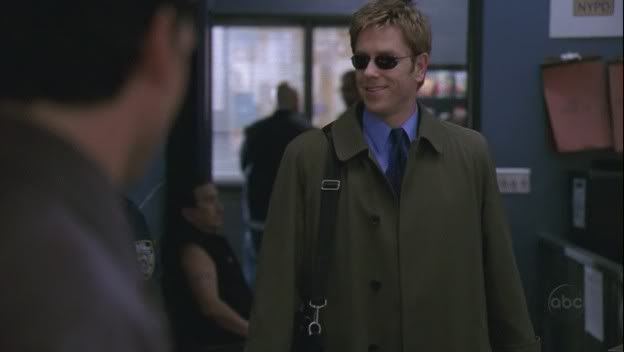 It was all there, the characters set up swiftly and skillfully: Jim, the tragic hero on a journey of redemption, Christie, the injured but faithful wife, Karen, the loyal partner/friend, Marty, the hotheaded rival, Tom, the ultimate nice guy, and Fisk, the eye of the hurricane. Characters so strongly established that the writers were then afforded the luxury of nuance, the small character “reveal,” the telling moments we all came to wait for. Again, well said! You have nailed the heart of each character. I especially like your description of Fisk. Although others have said they like the way Dunbar’s sense of humor was revealed as the show progressed, I think it was there from the beginning. Granted, it was the kind of humor you use to diffuse tension when you’re the Odd Man Out, but it was one aspect (of many) that made this character so likeable. Agreed. The humor even glimmered for a moment when he was kissing Christie good-bye and said, "I don't think it'd look too good, getting dropped off." Not a particularly funny line, but that little self-deprecating smile that accompanied it showed the audience who this guy was almost immediately. It also showed us how he had been able to come through such a traumatic event intact. The look on Dunbar’s face as he struggles to absorb the blow, yet respond positively, is a heartbreaker. (I vote for this shot as one of the finest close-ups of the series, second only to the scene with Galloway in "Marlon's Brando.") 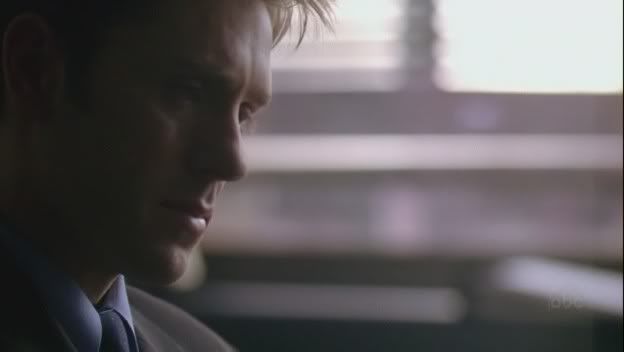 I quoted this just to get that picture up again. The Pilot is so tight, so compelling, not only for the crisp, character-specific writing and the corkscrew plotting, but for Ron Eldard’s fearless and charismatic performance. He didn’t have to settle into the character. He got it right, immediately, inhabiting the altered reality of blindness down to the tiniest detail. I’m a fierce critic when it comes to actors “playing disabled,” as it’s more often than not an excuse for overacting -- but did Eldard ever hit one false note? Did anyone ever catch him “acting”? Can anyone think of another lead actor last season who did such sensitive, strong, and utterly persuasive work? (Another reason to lose all respect for the Emmy voters, right?!) In the TV Guide preview of the show, Ron Eldard admitted to having a fascination with people with disabilities and had always loved trying to figure out how they were able to do things so I think that may have been part of the appeal of this role for him. He was determined to "get it right" and worked very hard to do so. I can't imagine anyone else being able to pull of what he did here. Good Old Terry. That prince of a guy whose cowardice caused Jim to be blinded. Good Old Terry, who is still -- after a year of Jim ducking his calls -- looking for forgiveness, for the kind of expiation he cannot find in himself and probably doesn't deserve. Good Old Terry, who is still looking for Jim to tell him it didn't matter. When it so clearly, so tragically, did and does. "We both know what happened that day," Jim says harshly. "Don't try to pretend differently." (Or have I segued into "Up on the Roof?" Oh well, the emotional truth is there, and identical.) Nope. Still the Pilot, although any mention of Terry could veer over to other realms very easily. Love the way you summed him up here, by the way. And with this part: Karen stops him and puts his hand on her arm. "You don't mind?" he asks in a moment of unexpected vulnerability. Was she being a natural, or was it because, as part of maintaining an official police presence, Jim would look less blind at her elbow than he would tapping his way along the sidewalk? Would Karen look less like she’d been saddled -- as a woman and as the junior member of the squad -- with a "damaged" partner? Perhaps a little of both. But however fleeting the moment may be, it is the beginning of trust and friendship, the beginning of acceptance. I like all the speculation about Karen and why she was so quick to offer that kind of aid. This reminds me of something that occurs to me whenever I watch the Pilot. When Karen and Jim approach Kim about her car,  it's their first time approaching anyone as partners. Karen rushes ahead and makes the introduction, "Detective Betancourt and...Detective Dunbar," she says apologetically and she looks embarrassed when Jim steps up beside her. It makes perfect sense that she would try and minimize the look of Jim's blindness the next time they go to interview someone. So...was she a natural? Yes. Did she make it possible for Jim to do his job? Of course. But was she just being nice? No. It benefited her to not appear to be "saddled" with a broken detective so she made the best out of her partnership with Jim and both of them came out on top because of it. Smart girl. When Jim finally gets his chance at an interrogation, it's brilliant. Simply brilliant. Here, in short, is the Old Dunbar, the kick-ass Dunbar that was. The casual and practiced manner in which he "accidentally" clips Randy with his elbow -- how many times, and in how many ways, did he use this move in the good old, bad old days? I noticed Russo "bumping into" a suspect in Rub a Tub Tub. Yes, it worked with a sighted cop, but Jim doing it intentionally as a blind cop is brilliant because no one can even get mad at him on the chance that it isn't intentional. This may be the first time we see Dunbar using his blindness to his advantage on the job. Thanks for your revised recap, Mags. And for all the new screencaps. It's always fun to revisit such favorites. |
|
|
|
Post by housemouse on Oct 7, 2005 11:24:52 GMT -5
Maggie thanks for bringing the pilot in to clear focus, and helping me relive that morning (I had it on tivo) I first met Jim Dunbar. What a wonderful write-up. The first shot hooked me . . . the close-up of Eldard’s amazing eyes, alert, sharply focused, as he entered into the shootout at the bank. As the scene progressed -- bleached palette, jump cuts, voices slowed, fragged images edited so you felt the confusion but still knew exactly what was happening -- I realized I was holding my breath, not quite believing what I was seeing. Not quite believing that this good-looking blond guy, whoever he was -- “Terry, he’s empty, take the shot, Terry!” -- had to cross the street to wrest the gun from the hands of his cowering partner, and calmly and purposefully walk toward the gunman and fire the shot that tore out his jugular, and then -- immediately -- the horrific shock of the bullet tearing across his temple, his head jerking back . . . and the bookend, the second close-up of Eldard’s eyes, blank, unseeing, his face pallid and damp with sweat. Now, from a distance, one of the reasons I find the opening so valuable is not only because it set up the premise of the show -- and brilliantly -- but because it is the best evidence we have of the kind of cop Jim Dunbar was before he was blinded. And he was about as good as it gets: smart, supremely confident, intuitive, quick to act, and brave as hell. I tuned in because I have been a Ron Eldard fan for quite some time. I first saw him in When Trumpets Fade back in 98 or so and have been hooked ever since. I barely remembered his story arc on ER, but I did remember the charismatic actor who is completely lost in his characters. The beginning scenes are pitch perfect. There is an excellent juxtaposition between the confident, dare I say cocky, sighted Jim Dunbar and the terrified eyes we see popping open hoping it was all just a bad dream. Images, coming thick and fast. Making coffee, shaving, the ordinary details of a distinctly un-ordinary life. Jim packing for work, putting his laptop and cane in his bag, then reaching into the desk drawer for a detective’s shield and a gun. (A gun? How is this going to play out?) Christie, keeping the tension out of her voice but not off her face or her twisting hands as he walks out the door. Our hero has come a long way since that day at the bank, but all is not normal, it never will be again. The subway, the street, people staring, the reporters. Have we even hit the ten minute mark yet? And then the squad room. Does this guy make an entrance or what? Tall, good-looking and well dressed, the shades, the dog, the pained half-smile. I remember noticing the way he appears to be surprised at the press coverage. He is just a guy trying to get back to his job. And the silence that falls. “Jim Dunbar for Lieutenant Fisk.” Fisk waving him off through the window. “He’s on the phone.” “I’m assigned here.” Marty answering, sourly, “We know.” And we’re off and running. I disliked this character immediately after this reaction. Fisk had a long way to go to improve my opinion of him. Over the course of the first few episodes, between the excellent writing and Michael Gaston's amazing acting, I started to like Fisk. Although others have said they like the way Dunbar’s sense of humor was revealed as the show progressed, I think it was there from the beginning. Granted, it was the kind of humor you use to diffuse tension when you’re the Odd Man Out, but it was one aspect (of many) that made this character so likeable. “Anyone allergic to dogs?” “So who’m I riding with, being as how the dog can’t drive?” Think about that last line for a minute. It follows directly on the heels of the interview with Fisk: what are you going to do (i.e. contribute) at a crime scene, the gun waiver, and the fact, baldly stated, that while Dunbar was respected, that was yesterday’s news and no one wanted to work with him. The look on Dunbar’s face as he struggles to absorb the blow, yet respond positively, is a heart breaker. (I vote for this shot as one of the finest close-ups of the series, second only to the scene with Galloway in "Marlon's Brando.") I was actually embarrassed for the character after his attempts at humor. He was trying to diffuse the situation, but frankly the jokes weren't all that funny and they only served to increase the tension. In some ways they even highlighted the differences in the pre and post shooting Jim Dunbar. Before being blinded Jim could care less what anyone thought of him. He was good and he knew it, if his attitude made people uncomfortable that was their problem. Now he is all about trying to regulate people's reactions to him. This is not the entrance he is accustomed to making. Karen is furious. "Great," she tells Jim when he attempts to persuade her that he's no longer the ladies man who romanced her friend Anne. "I've done a lot of growing up since then," he reassures her. "Tell me another one," her expression says. (In Brooklynese? Fuggeddabouddit.) "Meanwhile, there's a guy cutting girls' tongues out and we're working a stolen car," she answers, acid dripping from her voice. She's not about to cut Dunbar any sort of slack, his reputation and past record notwithstanding. Balls of steel at the bank don't cut any more ice with her than they do with the openly skeptical, openly confrontational ("Tell me that gun on your hip is plastic . . . ") Marty Russo. She's been pulled off a major case for "punk ass" reasons, and reason number one is James Dunbar, who can't even follow the The Boss into his office without falling all over himself. Or his dog. But she's working that stolen car with Our Hero, who grew up in Red Hook, who fought in the infantry in the Gulf War, and who took more guns off the street when he worked anti-crime than any other five precincts combined. His instincts are as sharply honed as they ever were. He smells cordite in the car, the lingering effluvia from a gun having been fired recently. "This is a crime scene," he says firmly, the old confidence returned. I think the writers did an excellent job of making Karen very real. She did not react to him with pity, she came from a more selfish place of wondering how this was going to affect her career. It was pretty fearless of them to present Karen in this way. The did it and did it well, they made us understand Karen's point and not fault her for not wanting to blind guy to drag her down. The Pilot is so tight, so compelling, not only for the crisp, character-specific writing and the corkscrew plotting, but for Ron Eldard’s fearless and charismatic performance. He didn’t have to settle into the character. He got it right, immediately, inhabiting the altered reality of blindness down to the tiniest detail. I’m a fierce critic when it comes to actors “playing disabled,” as it’s more often than not an excuse for overacting -- but did Eldard ever hit one false note? Did anyone ever catch him “acting”? Can anyone think of another lead actor last season who did such sensitive, strong, and utterly persuasive work? (Another reason to lose all respect for the Emmy voters, right?!) In everything I have ever seen him in (which is just about everything he has done), Ron Eldard disappears completely into the character. He is not like actors who in every role play a variation of themselves (Jack Nicholson or Christian Slater anyone). I would call him one of the most underrated actors in Hollywood. I am holding out hope that he will get the Oscar nomination for Freedomland, that he should have gotten for House of Sand and Fog. As sharply played as that scene is -- and as much as it tells us about the state of their marriage -- what resonates is the way it ends, Jim sitting and flipping a ball against the living room wall. The paint is pitted, gone. You just know how much time he’s spent flipping that damned ball and brooding, and, as flawed and prickly as he is, you ache for him. As many times as I have seen the pilot and all of the other episodes (which is almost as many times as I have seen The Godfather - a lot!), this scene still resonates with me as one of the most memorable. I just love all that is put into that one small scene. Jim is working out his frustration, honing his coordination, doing something that might not be expected of a blind guy, and probably going into a deep meditation. Great scene. Good Old Terry. That prince of a guy whose cowardice caused Jim to be blinded. Good Old Terry, who is still -- after a year of Jim ducking his calls -- looking for forgiveness, for the kind of expiation he cannot find in himself and probably doesn't deserve. Good Old Terry, who is still looking for Jim to tell him it didn't matter. When it so clearly, so tragically, did and does. "We both know what happened that day," Jim says harshly. "Don't try to pretend differently." (Or have I segued into "Up on the Roof?" Oh well, the emotional truth is there, and identical.) I have always thought that Jim saying he didn't want his anger to boil over when it heats up, was a reference to this exchange with Terry. Jim is tense from his head to his feet in this conversation, and it is taking every bit of self control he has to keep from shouting "THIS IS ALL YOUR FAULT!!" at Terry. Karen stops him and puts his hand on her arm. "You don't mind?" he asks in a moment of unexpected vulnerability. Was she being a natural, or was it because, as part of maintaining an official police presence, Jim would look less blind at her elbow than he would tapping his way along the sidewalk? Would Karen look less like she’d been saddled -- as a woman and as the junior member of the squad -- with a "damaged" partner? Perhaps a little of both. But however fleeting the moment may be, it is the beginning of trust and friendship, the beginning of acceptance. This had to have been painful for Dunbar. There was no way he was going to ask for Karen's help, that would mean having to admit he needs it. But when she offered, he was certainly happy to take it, and that probably caused a tug of war in his mind between the old and new Dunbar. And then the scene where Jim pulls his gun on Randy Lyman. Controversial, yes, but can we stop and remember that this is fiction? The writers and actors made it work. What I take away from that scene is the contrast between the icy calm when Dunbar finally positions himself, knowing he’s aimed directly at Randy . . . . . and after, trying to pull himself together, flexing his shaking hands. So well done, so beautifully played. Brilliantly described Maggie, and brilliantly played Mr. Eldard. When Jim finally gets his chance at an interrogation, it's brilliant. Simply brilliant. Here, in short, is the Old Dunbar, the kick-ass Dunbar that was. The casual and practiced manner in which he "accidentally" clips Randy with his elbow -- how many times, and in how many ways, did he use this move in the good old, bad old days? The evidence bag of blond hairs, supposedly Lyman's and taken from Lynn Bodner's body, in reality Jim's, a quirky and savvy ploy no one -- not the viewer, not Fisk, and certainly not Russo and Sellway -- see coming. The lightening flashes of that quick, black-as-the-pit Dunbar humor. "Want us to publish a manifesto in the newspaper?" he sarcastically asks the vicious serial killer, fearlessly leaning into his face. "Want us to get your Mommy on the phone?" He will take his chances where he can, using this interrogation to confront the "elephant in the room" when he addresses The Boys Club directly through the two-way mirror with the “No one wants me here as a detective so I have to try a little harder” speech. And again, after it's over and Lyman has been broken, we see what it has cost him when he's leaning against the wall, gratified that he’s been able to do what he knows he’s good at, but spent, utterly spent. For the first time we see him use the blindness to his advantage by "accidentally" knocking Randy in the head. The old Dunbar shines through loud and clear. He is in his element, doing what he does best: police work. He manages not only to get the "perp to go" but to teach his fellow squad members a little about interrogation. I rate the ending of the Pilot as sheer perfection, with Jim and Karen on the street, finally talking honestly and openly. It’s going to take time but they’re going to be all right, these two. He understands, Our Jim, because he's had a year to stew and think and brood about just this, he understands that no one in their right mind would want to be partnered with a "guy who couldn't see." All he's asking for -- it's all he wanted in his year-long fight against the department -- is a chance. “What do you look like?" he finally asks her, and you know he's been curious after all they've been through in a short time. “You’re such a great detective, you tell me . . . and don't overshoot the weight if you know what's good for you," Karen replies lightly. A cute, if slightly flirtatious remark, rendered "safe" by his blindness. But he does know. He's knows that her hair brushes against her shoulders, he knows that she's alone or her man would be calling her constantly, he knows that she's pretty because the guys in the squad keep coming up to her all . . . day . . . long. But he doesn't know what color her eyes are, and, somehow, that's important to him. "Don't put your moves on me," she says. "That's not what I'm doing," he responds, disappointed. Shot down, crestfallen, he and Hank walk away, through a flock of pigeons that rise to the sky like scraps of torn paper, and then Karen stops him with “They're brown.” Her eyes are brown. “Thanks,” he says with a smile. “Now I know.” And he walks on. Amen sistah! |
|
|
|
Post by maggiethecat on Oct 8, 2005 15:44:34 GMT -5
Thanks, Shmeep and Housemouse, for those wonderful and beautifully expressed responses. It's like "Up on the Roof," isn't it? You can talk about The Pilot ad infinitum. (And we do. And we will.)
Oh, that quick little scene with Terry in the break room. It's all there, all we'll need to set up "Up on the Roof," and you're right, Jim's body language is so telling. So is Terry's, the way he fiddles with the solitaire game on the table, the way in which he seems afraid to look Jim in the face even though he knows full well the guy can't see him. (Or is it because he can't bring himself to face the stark consequences of his actions?) How desperately has he been waiting to talk to Jim, that he comes down to his new precinct house on his first day back at work? How much control does it take for Jim to not yell, as you pointed out, Mouse, "This is all your fault!" He only ever really lets fly at Terry once, I think, when he comes to his house in "Up on the Roof" and Terry says, "You're not the Jimmy Dunbar I knew." "Yeah, tell me about it," he says, and it's the only time I can think of where his voice is truly bitter. In their other exchanges -- notably the final scene at the river -- it's all about self-control, which is just another reason to like and admire Dunbar's character.
As if we needed a reason!
Anyway, thanks again. Every time I watch The Pilot, or even talk about it with you, I have even more respect and admiration for what the writers, actors, and director accomplished in just forty minutes.
|
|
|
|
Post by hoosier on Oct 8, 2005 17:31:06 GMT -5
What amazes me is the versatility of Ron Eldard. Not only is he convincing as a blind man ,he is able to convey with a look or a gesture what some actors need an entire paragraph to tell : The pained look on his face when he learns no one wants to work with him, the defensive body position when confronted by Terry, the shaking hands and shaky breathing in Lyman's bathroom, the "oh-geez" look when Karen tells him she is Anne's friend and how he slumps further into the car seat as if he wants to simply disappear, the slightly exasperated look with the "hey, blind (blond!) dude" remark. I never get tired of just watching his expressions.
Can he do it? Will he be able to do it? That's not only the question the squad has, its what Jim is asking himself. He's pretty confident--he has to be to have even gone through the whole process of trying to get reinstated. But you know he has some self doubt--heck, he wouldn't be human if he didn't but he can't let the others see that. By the end of the Pilot, he has proved to them and to himself that he still has what it takes. Like he told Karen, give him a little time and a little space and he would prove to her that he would make a good partner!
|
|
|
|
Post by Eyphur on Dec 9, 2005 16:42:15 GMT -5
I was watching the pilot this afternoon. And I was wondering what time of year is it supposed to take place? I had allways assumed it was late winter ie. late February or early March but I noticed that in the scene in the bedroom where Jim is waking up at 5:32 am it seems awfully bright outside. Now although I haven't got up that early since high school I don't remember it being that light out that early. Any thoughts?
|
|
|
|
Post by Katryna on Aug 7, 2007 4:40:21 GMT -5
I watched the Pilot last night and have a question that perhaps some of you in the legal profession might be able to answer. Forgive me if this has been discussed before. I don't remember that it has, but then there are as you know - THOUSANDS of posts to go back through. I thought just asking was easier! In the scene below, the beat cop asks Jim how much money he got when he sued the department. Jim replies that he didn't get any money, he just got his job back. I am assuming that the news reports would have made it clear that he was suing to be reinstated, but maybe they didn't. In any case, this cop and probably others apparently thought he was suing for damages. I admit that I am fairly ignorant about the legal profession/laws/etc.; so my question is this. Would Jim have had legal grounds to sue the Department for a cash settlement and on what grounds? 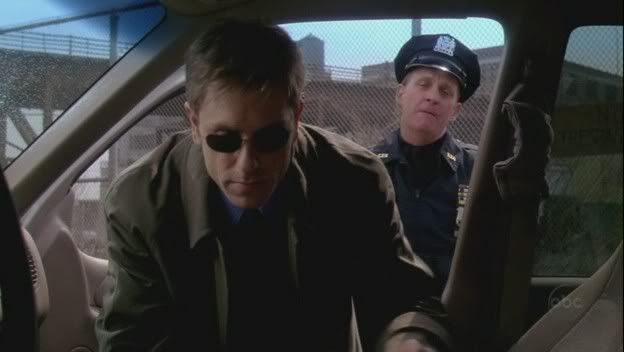 |
|
Deleted
Deleted Member
Posts: 0
|
Post by Deleted on Aug 7, 2007 6:21:58 GMT -5
I watched the Pilot last night and have a question that perhaps some of you in the legal profession might be able to answer. Forgive me if this has been discussed before. I don't remember that it has, but then there are as you know - THOUSANDS of posts to go back through. I thought just asking was easier! In the scene below, the beat cop asks Jim how much money he got when he sued the department. Jim replies that he didn't get any money, he just got his job back. I am assuming that the news reports would have made it clear that he was suing to be reinstated, but maybe they didn't. In any case, this cop and probably others apparently thought he was suing for damages. I admit that I am fairly ignorant about the legal profession/laws/etc.; so my question is this. Would Jim have had legal grounds to sue the Department for a cash settlement and on what grounds?  Based on what I do, he probably filed in relation to discrimination, as the character is covered by the ADA - Americans with Disabilities Act. |
|
|
|
Post by matilda on Aug 7, 2007 7:27:53 GMT -5
I would have thought yes, pursuant to provisions of Act as detailed above - always assumed that's how he got reinstated ie made application for reinstatement on basis of of Act's "reasonable adjustment" Clauses - help me out U.S. experts - and if agreement (" .. nothing, I got my job back ... ") couldn't be reached then monetary settlement would be explored between parties.
You are so right - so often on the grapevine and often put out there by the employer is the 'suing for damages' tale. One of the things I loved about the show was the character's insistence that he could do the job and therefore deserved to be " ... given a chance ..." - to me, it so wasn't about the money.
Cheers and thanks
Matilda
|
|
|
|
Post by mlm828 on Aug 7, 2007 11:57:59 GMT -5
The remedies available under the ADA are similar to those available under Title VII, which deals with other types of employment discrimination. As I recall (it's been a few years since I handled employment cases), Title VII doesn't provide for traditional money damages, but does allow for recovery of back pay (in Jim's case, this would be back pay from the date on which he should have been reinstated, according to the court's decision), as well as remedies such as reinstatement. My guess is that the fictional lawyer who filed the lawsuit would have asked for all available remedies. Even though Jim's goal was reinstatement, you'd want to cover all the bases. And you can be sure there would have been a request for attorney's fees, which the prevailing party can also recover. New York State probably has its own disability-discrimination law, which may provide remedies in addition to, or different from, those provided by the ADA. I suspect the cop who asked how much Jim got from suing the department was simply reflecting the common perception that winning a lawsuit is like winning the lottery.  And I'm guessing the writers had the cop ask that question to emphasize the point that Jim wasn't after money, he only wanted his job back. The reference to a "cash settlement" raises a further point. I'm fairly sure Jim got his job back as a result of a settlement. This is mainly because I doubt the lawsuit could have run its full course of pre-trial discovery and other pre-trial proceedings, trial, and an appeal by the losing party, in only a year. A settlement in this case could have been the purpose and the result of the "political pressure on the Mayor in an election year" which one of the reporters mentions as Jim is walking toward the 8th Precinct on his first day. A settlement does not always involve only the payment of money. In a case such as this, it could also provide for Jim's reinstatement and specify the terms on which he is being reinstated (for example, the sessions with Galloway which, according to Fisk, were a condition of Jim's reinstatement). |
|
|
|
Post by Colorado girl on Aug 7, 2007 13:43:23 GMT -5
Martha, I really appreciated your explanation of Jim's reinstatement. Karma for that.
|
|

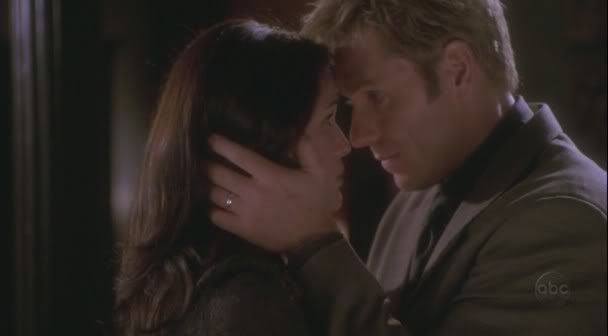

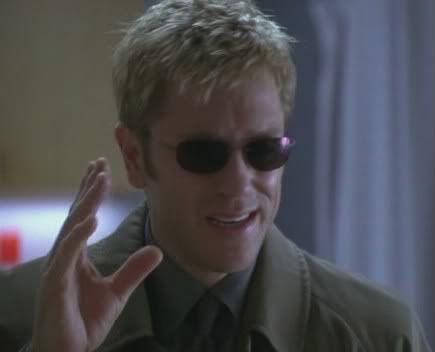


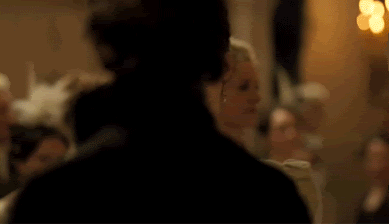



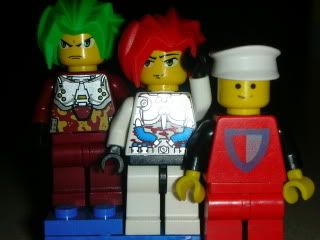



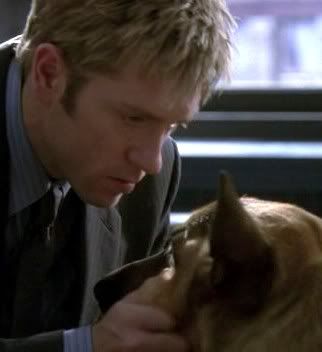
 And I'm guessing the writers had the cop ask that question to emphasize the point that Jim wasn't after money, he only wanted his job back.
And I'm guessing the writers had the cop ask that question to emphasize the point that Jim wasn't after money, he only wanted his job back.